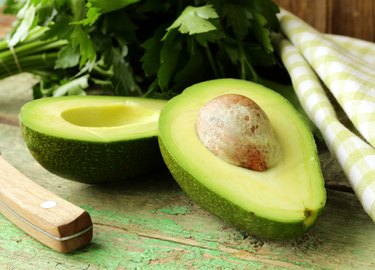
If you have diabetes, you know that food plays a big role in controlling your blood sugar levels. Carbohydrate--containing foods, which include sugar, sweets, sugary drinks, grains, starchy vegetables, fruits and some dairy, are converted to sugar during the digestion process and therefore contribute to raising your blood sugar levels after eating. A high--carb intake will result in high blood sugar levels.
Nutrition Facts
Video of the Day
The nutrition facts for avocado depend on its size. For example, a whole California avocado provides about 227 calories, 11.8 grams of carbohydrates and 9.2 grams of fiber, while a Florida avocado is larger and contains 365 calories, 23.8 grams of carbohydrates and 17.0 grams of fiber. With diabetes, carbohydrates elevate your blood sugar levels, but only the starch and sugar part of the total carbohydrates, not the fiber.
Video of the Day
Available Carbohydrate and Diabetes
To better estimate the effect of avocado on your blood sugar levels, you can calculate their available carbohydrate content by subtracting fiber from the total carbs. In the case of a California avocado, you get 2.6 grams of available carbohydrates, while a Florida avocado contains 6.8 grams of available carbohydates because of its larger size. Usually, people with diabetes are recommended to limit their carb intake to 45 grams to 60 grams per meal. Avocado contains very small amounts of available carbohydrates and are not problematic for diabetes control, even if you eat a whole, large avocado.
Typical Meals With Avocado
Although avocado itself is not likely to hinder your glycemic control, it is often served with high-carb foods such as tortillas, nacho chips and taco shells. If your meal includes foods that have a high carbohydrate content, your blood sugar is likely to rise, so count your carbs to ensure you do not eat more carbohydrates than your body can handle.
Monounsaturated Fats
Avocado is not like other fruits because it has a low sugar and carbohydrate content, but a high fat content. Most of the fats found in avocado are monounsaturated fats, the heart-healthy kind that is also found in olive oil and nuts. These healthy fats constitute the cornerstone of the Mediterranean diet. Monounsaturated fats can help you keep your blood cholesterol levels under control and reduce your risk of heart diseases, which, unfortunately, is a frequent complication of uncontrolled diabetes.
Adding Avocados To Your Diet
If you wish to include avocado in your diet, make sure you have it with a healthy carbohydrate--controlled meal. For example, you can add slices of avocado to your salad, serve your chicken with a guacamole or add avocado to a smoothie made with plain yogurt and raspberries for a delicious creamy breakfast, dessert or snack. Remember to count the carbohydrates of the other food you eat to keep your carbs and blood sugar levels in check.